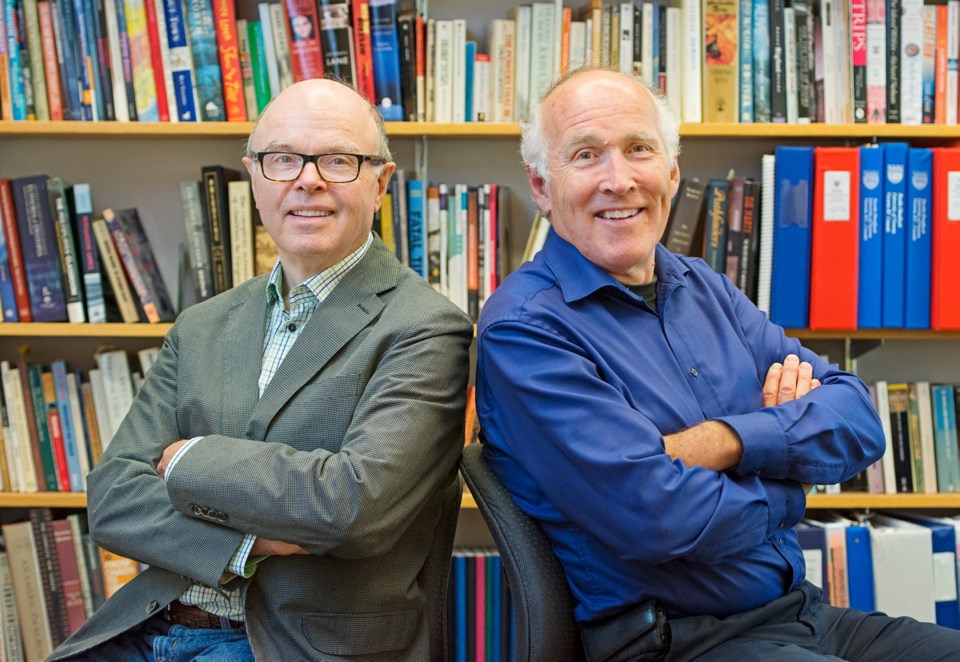A historian who describes himself as a “gadfly” with broad curiosity and a poet who revels in interdisciplinary collaboration will both receive the highest honour in Canadian academics.
University of Victoria professors Eric Sager and Tim Lilburn will be inducted into the Royal Society of Canada on Nov. 22. They are among 90 new fellows elected by their peers for outstanding scholarly, scientific and artistic achievement.
Although working in different disciplines, Sager and Lilburn both expressed an interest in the ways history and poetry, respectively, can enlighten and inform the public.
“You can’t live any intelligent and informed life as a citizen without some historical awareness or consciousness,” Sager said.
Lilburn, meanwhile, described the effect of poetry and other art forms on an emotional level: “They give access that I think other forms of thought and expression don’t, to have a kind of deeper human sensibility and emotion.”
Sixty-six past and present UVic scholars, scientists and artists are fellows of the Royal Society of Canada.
Sager is the sixth UVic historian to join the society in recent years. He described his career as one of variety, covering everything from maritime to family history.
“It’s almost as though I’ve had more than one career,” Sager said.
A child of the 1960s, Sager’s first academic interest was in 19th-century anti-war protests in England, a subject to which he dedicated his graduate studies.
“The Vietnam War protests were my introduction to politics, and I wanted to find out why some people protested against war in the past, and why some people came to believe that all war was evil,” he said.
At Memorial University in St. John’s, N.L., he wrote books on the rise and fall of the sailing-ship industry and the history of maritime workers. Next came oral history, with books based on interviews and memories. And in 1992, during a holiday in Darwin, Australia, he became fascinated with the town’s history and wrote a book about that, too.
“That was great fun,” he said.
More recently, Sager became a “census junky,” mining historical census data in Canada for information about the conditions of unemployment and family life. From 1996 to 2002, he directed the Canadian Families Project, creating a national database with information about family economics, fertility control and more.
He has also written about the history of income inequality, with relevance to contemporary movements like Occupy.
At the core of his interest is history’s application in the present. While it can’t be used to prescribe solutions, he said, a society without collective memory is about as functional as an individual with amnesia.
“There’s no simple prescriptions from the past about how we improve our lot in the future. But without history, we have no hope.”
Like Sager, Lilburn’s interests are not limited. He has written nine books blending poetry with ecology, philosophy and spirituality.
Lilburn’s most recent book of poetry, Assiniboia, imagined what Western Canada might have looked like if Louis Riel’s rebellion had succeeded. In its description of his work, the Royal Society of Canada said Lilburn’s work has elucidated “our relationship to landscapes and their ecologies, to offer paths forward to living ethically within these relationships.”
“A lot of my work has a philosophical preoccupation and a political preoccupation,” Lilburn said. “Poetry is not limited to pieces on the beauty of nature.”
Next week, Lilburn will travel to Regina for a rehearsal with dancer Yvonne Chartrand, who will interpret his work.
“That kind of cross-disciplinary or cross-art-form collaboration I find really exciting,” he said.
Lilburn is also a prominent essayist on poetics, and his work has been widely anthologized and translated into French, Chinese, German, Spanish and Polish. He said poetry is alive and well in Canada and the international community is taking note of the works produced here.
Asked what makes strong poetry, he said: “Be beautiful and intelligent. And be transfixing, both on the page and in performance.
“I think poetry can do that. I think dance can do it and music can do it, too. And it reaches a deep layer, inside a listener, that maybe other things can’t.”



